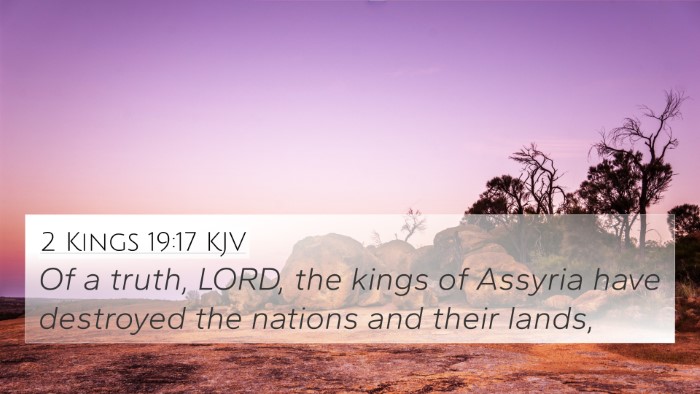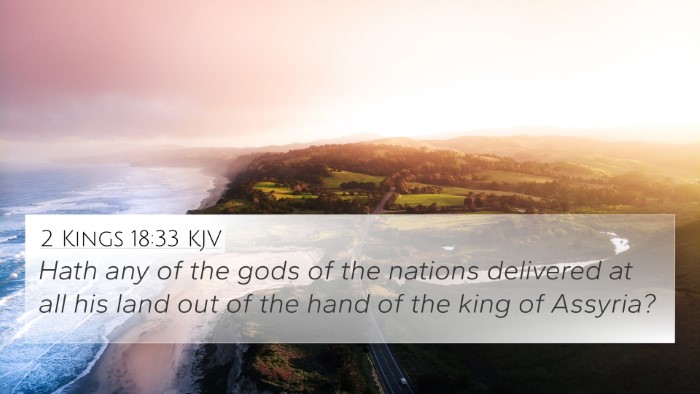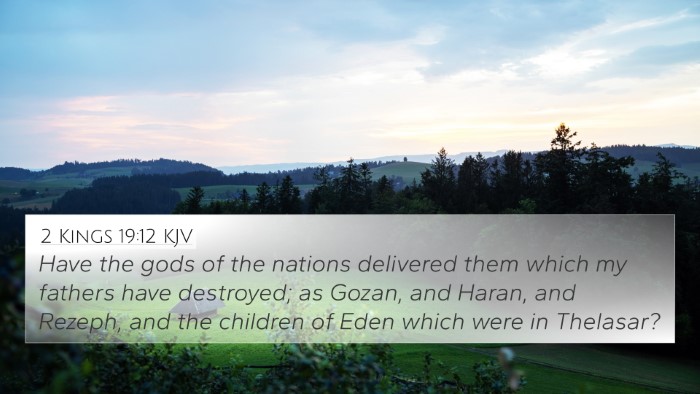Understanding Isaiah 10:10
Verse: Isaiah 10:10 states, "As my hand hath found the kingdoms of the idols, and whose graven images did excel them of Jerusalem and of Samaria." This verse reflects the arrogance and confidence of the Assyrian king who boasts about his victories over idol-worshipping nations.
Verse Meaning and Context
This verse originates from a section in Isaiah that addresses the impending judgment on Israel and the Assyrians' role as instrument of God’s will. The Assyrians, epitomized by their king, pride themselves on their conquests as if they had overcome the true God of Israel rather than merely achieving military success.
Commentary Insights
- Matthew Henry: Henry notes the self-importance of the Assyrian ruler. The verse illustrates how he equates his victories over Jerusalem and Samaria to a triumph over their gods. He emphasizes the prevailing pride and the idolatrous state of the nations he conquered.
- Albert Barnes: Barnes provides an interpretation focusing on the hubris displayed by the Assyrian king. He also identifies the fallacy in believing that military might can overcome the divine. The exploits mentioned reflect a moment where confidence in earthly power leads to overlooking spiritual reality.
- Adam Clarke: Clarke underlines the shift in power dynamics, highlighting that while the Assyrians saw themselves as formidable adversaries, they were being used as tools to enact God’s judgment against His own people. Clarke also breaks down the referenced kingdoms to illustrate the comparison of idol worship versus the worship of God.
Cross-Referencing Biblical Texts
To gain a comprehensive understanding of Isaiah 10:10, we can explore various Bible verse cross-references. These connections help elucidate the themes of pride, judgment, and the sovereignty of God over nations.
Related Bible Verses:
- 2 Kings 18:33-35: This passage recounts the Assyrian king's confrontations with Jerusalem, showcasing his pride and claims regarding their gods.
- Isaiah 36:18-20: Similar to 2 Kings, this text conveys the challenge posed by the Assyrians against the God of Israel, emphasizing their misconceptions around divine authority.
- Jeremiah 50:2: Here, the fall of Babylon is prophesied, symbolically reflecting the downfall of those who rely on idolatry.
- Romans 11:28-32: This New Testament reference bridges the Old Testament context by discussing how God's plans involve the Israelites, despite their current form of rebellion or disfavor.
- Psalms 115:4-8: This scripture critiques idol worshipens, aligning with Isaiah's themes about the futility of trusting in powerless graven images.
- Isaiah 46:1-2: In this passage, God mocks the powerless idols and assures of His own sovereignty, contrasting divine power against human pride.
- Habakkuk 1:11: Assyria’s arrogance reflects larger themes in scripture, connecting the pride of nations with God’s ultimate justice.
- Matthew 23:12: In the New Testament, Jesus warns against the pride of leaders, paralleling the arrogance seen in Assyria.
- Revelation 17:8: The reference to nations as beasts relates to the ephemeral nature of power, fulfilling the prophetic nature of Isaiah's words.
- Micah 4:11-12: This reference reiterates the idea of nations gathered against Jerusalem, highlighting the continuity of themes of divine judgment and salvation throughout the ages.
Thematic Connections
By engaging with these thematic Bible verse connections, we can observe how Isaiah 10:10 not only reflects the historical context of Assyria but also serves to forecast God’s sovereignty through the ages.
Connecting Old and New Testament
It is significant to understand how Isaiah's message transcends time. The pride of nations in the Old Testament can be mirrored in New Testament teachings, where Jesus often counters such arrogance, emphasizing humility and reliance on God rather than human strength.
Using Tools for Bible Cross-Referencing
Utilizing resources such as a Bible concordance or a Bible cross-reference guide can aid in deeper studies. Understanding how to find and use cross-references efficiently enhances scriptural insights.
Conclusion
In conclusion, Isaiah 10:10 serves as a reflection of the dynamics between human arrogance and divine authority. Through careful analysis of cross-references and related verses, one can better appreciate the depth of God's message to not only Israel but to all nations regarding judgment, pride, and the necessity of recognizing His sovereignty.








